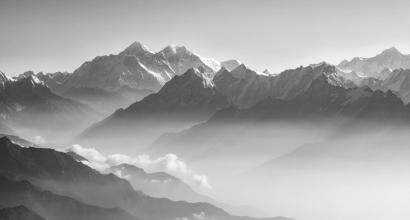Let us now remember and discuss these in some detail.
1) The pre-eminence of the self: The ātmā (self) is the essence of all beings. Whenever man thinks, "I","me", the referent of the "I" is the jīva. Both the jīva and its support and instrument - the body with sense organs and the mind - are referred to as the ātmā. The ātmā marked by an association with the body-sheath is known as the jīvātmā. In principle, the ātmā is distinct from the adjuncts of the jīva and is known as the śuddhātmā or kevalātmā. The adjuncts of the jīva exist momentarily, are subject to modification, and then disappear. The ātmā however is without modification or destruction.
acchedyo.yamadāhyo.yamakledyo.śoṣya eva ca.
nityaḥ sarvagataḥ sthāṇuracalo.yaṃsanātanaḥBG 2.24
avyakto.yamacintyo.yamavikāryo.yamucyate
BG 2.25
dehī nityamavadhyo.yaṃdehe sarvasya bhārata
BG 2.30
Hence ātmā is the consciousness that energises everything without adhering to anything in the melange of ingredients that is man. The ātmā therefore is the highest of all human elements and the most important. Consequently, the well-being of the ātmā has to be the first goal of all endeavours.
As far as I know, there is no equivalent word for “ātmā” in the English translations of the Bible or the Quran. Even those doctrines might accept the concept of jīva. The word ātmā is usually translated as “soul”. Just as ātmā is used among us to refer to mind and other things depending on the context, the word "soul" too is used to refer to many things. Presently, the word ātmā refers to the pure consciousness that is in every jīva. It is one aspect of a great and excellent thing called Brahma. What is referred to here is not the limited and impure jīva but the pure ātmā. The infinite consciousness that sustains the universe while being is beyond it is the Supreme Brahma. ātmā is one of the modes of experiencing Supreme Brahma that pervades the universe within and without. Every single life-principle and every moral precept issues from the acceptance of Brahma. This is one of the cardinal teachings of the Gītā. All other instructions flow from the instruction of the ātmā’s primacy. The ātmā within the jīva is the most important. Everything else is insignificant and worthless in comparison. This is the first instruction.
2) The acceptance of Īśvara’s authority: Īśvara is the active aspect of parabrahma-caitanya. The same consciousness that is known as the jīva through its individual and separate aspects is collectively known as paramātmā that is all pervading. The same paramātmā is known as īśvara when seen as active in the līlā of the world. In the world transcending state, it is known as parabrahma. Thus, when the great, indivisible, infinite, and immeasurable consciousness that encompasses all jīvas and the entire universe is understood by the jīva to be the controller of the world, progress begins for the ātmā within it. The following, "There is a master to whom we must be obedient. The world follows his will" have to be accepted. The world makes us forget Īśvara through its magical fantasies. We are afflicted by delusions such as "I am the lord. I am the enjoyer." The first step towards upliftment is to accept the overlordship of Īśvara.
sarvasya dhātāramacintyarūpam
-BG 8.9
gatirbhartā prabhuḥ sākṣī nivāsaḥ śaraṇaṃsuhṛt |
prabhavaḥ pralayaḥ sthānaṃ nidhānaṃ bījam avyayam-BG 9.18
sarvataḥ pāṇipādaṃ tatsarvato.kṣiśiromukham
sarvataḥ śrutimalloke sarvamāvṛtya tiṣṭhati-BG 13.14
If we accept Īśvara, he has already said that he will look after our welfare.
ananyāś-ciantayanto māṃ ye janāḥ paryupāsate
teṣāṃ nityābhiyuktānāṃ yogakṣemaṃ vahāmyaham-BG 9.22
It is in the relationship between the jīva and Īśvara that there are debates between the philosophical schools of dvaita, advaita and viśiṣṭādvaita. This will be discussed in a separate appendix.
3. Acceptance of the principle of dharma: Christianity and other religions also accept that we have to be obedient to Īśvara. That is indeed a dharma. dharma is of the form of Īśvara’s orders. It purifies the jīva and is conducive to its benefit.
śāśvata-dharma-goptā |
-BG 11.18
is how Arjuna extolled Īśvara. There are many adhārmic people in the world. Bringing them on the right path is Īśvara’s responsibility.
mama vartmānuvartante manuṣyāḥ pārtha sarvaśaḥ |
-BG 4.11
brahmaṇo hi pratiṣṭhā.hamamṛtasyāvyayasya ca |
śāśvatasya ca dharmasya sukhasyaikāntikasya ca ||-BG 14.27
Dharma is never completely destroyed at any time.
yadā yadā hi dharmasya glānirbhavati bhārata |
abhyutthānamadharmasya tadātmānaṃ sṛjāmyaham ||-BG 4.7
The responsibility of protecting dharma rests with Īśvara.
paritrāṇāya sādhūnāṃ vināśāya ca duṣkṛtām |
dharmasaṃsthāpanārthāya saṃbhavāmi yuge yuge-BG 4.8
We have to accept dharma.
4. Limiting desire for pleasure: The precept of limiting our desires and pleasures is included in the acceptance of Īśvara’s authority. That is the crux of dharma. We have to continuously filter out our desires, our attractions, repulsions, and infatuations. Bhagavān has clarified thus without a chance for forgetfulness.
kāma eṣa krodha eṣa rajoguṇasamudbhavaḥ |
mahāśano mahāpāpmā viddhyenamiha vairiṇam ||-BG 3.37
We can bring the famous metaphor from the kaṭhopaniṣad to mind.
ātmānaṃ rathinaṃ viddhi śarīram rathameva tu |
buddhiṃ tu sārathiṃ viddhi manaḥ pragrahameva ca
indriyāṇi hayānāhurviṣayāmsteṣu gocarān-Kaṭhopaniṣad 1.3.3-4
The formidable sense organs drag us hither and thither. They must be restrained.
5 . World order: Was it not for the universe to exist that Bhagavān created it?
lokasaṅgrahamevāpi saṃpaśyan kartumarhasi
-BG 3.20
kuryādvidvān-stathāsaktah cikīrṣurlokasaṅgraham
-BG 3.25
Like in the above verses, the duty of maintaining world welfare has been mentioned several times in the Gītā. The house might appear to be dilapidated and dripping; about to collapse. To repair it is our duty. Let there be reverence towards the world. After all, is it not known as the city of Brahma? We must honour the world and respect its conventions. That is being
sarvabhūtahite ratāh
-BG| 5.25 | 12.4
(Engrossed in the welfare of all beings)
6. Ātmaupamya: is at the source of ethics and morality.
sarvabhūtasthamātmānaṃ sarvabhūtāni cātmāni.
Īkṣate || 6.29 ||
The practice of seeing others as similar to one’s ātmā has to be gradually expanded in scope. In the case of ordinary people, the practice of self-similarity is restricted to one’s family to one’s wife, children, kin and to a group of close friends. Man should bring within the envelope of his life as many people as possible, giving them space in his heart’s generosity, gradually making all beings his co-passengers in the journey of life. This is the consideration that is at the root of all moral precepts.
7. Yajña of Daily life: Activities have to be definitely performed. How?
saṅgaṃ tyaktvā phalāni ca |
-BG 18.6
Activities have to be performed as one’s own dharma.
svakarmaṇā tamabhyarcya siddhiṃ vindati mānavaḥ |-BG 18.46
What decides svadharma? We normally consider it to be śāstra which says -
itikartavyatābhāgaṃ mīmāmsā pūrayiṣyati |
The śāstra has to be applied to the circumstances of life. We have to determine our duty without opposing śāstra and in accordance with considerations of time and place. That is obligatory duty.
niyatam kuru karma tvam |
-BG 3.8
The source of so many contemporary problems can be found here. We come to believe that non-obligatory duties are obligatory. We believe that a lot of what is obligatory is not. Even governments are guilty of such mistakes. They neglect food production, grow industrial output to the size of mountains, overlook the defence of one’s own country while trying to rectify affairs of other countries. We forget the filth in our own children while trying to raise contributions for the nearby Rāma temple. What is obligatory cannot be decided upon without thought. If we look for the obligatory and without understanding it, choose to work upon the non-obligatory, it will be akin to forsaking one’s own dharma and accepting others’ dharma as one’s own.
Those activities that are orthogonal to the question of obligatory duties are necessary works such as yajña, dāna and tapas which are the worship of the divine, a reverence towards the world, and analysis of one’s self. These three are duties for all at all times
yajña-dāna-tapaḥ-karma na tyājyaṃ kāryameva tat
-BG 18.5
etānyapi tu karmāṇi saṅgaṃ tyaktvā phalāni ca
kartavyānīti me pārtha niśicataṃ matamuttamam ||-BG 18.6
There are a few who argue that the performance of activities is prescribed only for the ignorant or those with incomplete knowledge and not for the jñānī. It might be negligent of us if this argument is not explained with appropriate reasoning. Let us now discuss this to some extent.
Doesn't karma exist in the natural sense of the term for everyone?
na hi kaścitkṣaṇamapi jātu tiṣṭhatyakarmakṛt ||
-BG 3.5
Therefore, when the performance of karma is rendered inevitable by prakṛti, the only freedom that man has is not in giving up karma but in escaping from the bad fruits of karma. Thus it is necessary to analyse good and harmful karma. The śāstra helps in such analysis. Good karma is that which is prescribed by the śāstra which is of the form of rules and prohibitions. dharma is the body of karma that is ordained by the śāstras. Through the practice of dharma, impurities from earlier lives are lost, the jīva is purified, and the mind becomes fit for the knowledge of the absolute. Therefore karma becomes a tool for the seeker of jñāna. Thus this instruction is suitable for one whose knowledge is incomplete.
To be continued...
The present series is a modern English translation of DVG’s Kendra Sahitya Akademi Award-winning work, Bhagavad-gītā-tātparya or Jīvana-dharma-yoga. The translators wish to express their thanks to Śatāvadhāni R Ganesh for his valuable feedback and to Hari Ravikumar for his astute edits.







































